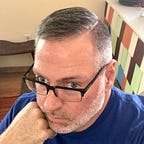Homophobia’s Invisible Workings
Or, why I changed my shirt
Yesterday, when we were driving home after a weekend at Dawgwoodz Camp — a gay men’s campground in Southeastern Missouri — we stopped at a gas station in Cherokee Pass and I changed my shirt.
I call that gas station the “Confederate Exxon” (it’s really a Mobil station) because they have two large racks of what can only be called ‘Fox News propaganda’, including many Confederate flag-themed and “Don’t tread on me!” bumper stickers, etc. The first time we went to Dawgwoodz Camp, we stopped there and I whispered to my husband, “Hurry up! I don’t think these are our people!”
Anyway…
On Sunday, I had been wearing my white 2019 Tower Grove Pride tank-top with its colorful flamingo graphic. But when we stopped at the ‘Confederate Exxon’ I changed into my Rockwell Beer Company t-shirt. It’s become my favorite because it’s got a beer company logo that doesn’t look like one. I think of it as ‘opaque marketing’: “If you can’t guess our name from the logo, you’re clearly not cool enough to drink our beer!” And since I’m nothing if not cool, it’s my fav tee…
But that’s not why I changed out of my tank-top. Oh, I pretended it was because there was the tiniest black spot marring its pristine white fabric or because I didn’t want to be cold at the Mexican restaurant in Farmington where we usually stop for lunch. But that’s not why.
It was because I was afraid I might become the victim of a hate crime.
No, I was not threatened and no, there was no precipitating event. In fact, we’ve met some of the loveliest people at Dawgwoodz Camp from the surrounding area.
But Southeastern Missouri — where all these places are located — is an evangelical ‘hot spot.’ It’s a rural area where Confederate flags are proudly displayed and churches are more common (and nicer) than schools.
Missouri ‘bootheel’ counties have some of the highest percentage of Republican voters in the country. Which is why Trump held a rally in nearby Cape Girardeau in the waning days of the 2016 Presidential campaign: Southeastern Missouri is lousy with Trump supporters.
You know, the ones who call for jailing leaders of the political opposition (“Lock her up!”) and sending U.S. citizens “back where they came from.” Again, not ‘my people.’
So, I changed my shirt when I got out of the car. I did it at the gas pump, which is daring for me. Before I even walked into the convenience store, used the restroom, or bought some water.
I changed my shirt.
I couldn’t really do anything about the “Union? Yes!” and iridescent rainbow stickers on the back of my car.
But I could mitigate the odds that I (or my husband) would be targets of arbitrary violence by some local given permission to act on his hate by Trump and his enablers. Reports of such crimes have quadrupled since Trump’s inauguration.
And that’s how homophobia works, how it makes our lives smaller. We don’t have to be actual victims of violence to be afraid. Even those of us living really, REALLY open lives — I’m practically a Professional Homosexual at this point — can still feel afraid.
We anticipate being discriminated against and censor our public lives in advance. We take little steps, often without thought, to make ourselves less visible, less vulnerable. We estimate the possibility of violence or abusive words before touching our partners in public. We lower our voices before speaking certain words or discussing certain topics.
We sit across from each other instead of side-by-side. We strategically deploy euphemisms like “the other half” to avoid the inevitable outing that comes with gendered terms for our partners (like “wife” or “husband”). We carefully evaluate wardrobe choices for any possibility they’ll attract the wrong kind of attention, especially at night, even in ‘gayborhoods.’
Many of us have never known a world where we didn’t have to weigh the benefits of being ourselves against the risks of being killed for it.
And with every tiny step we are diminished, often without even knowing it — because we’ve never known a world where we haven’t had to weigh the benefits of simply being ourselves against the risks of being killed for it. For far too many of us our public personas are little more than a reflection of the demands of the transphobic and homophobic society through which we move.
I’d say “in which we live” but is it really living if so much of your ‘life’ is just a cautious performance circumscribed by other people’s hatred and intolerance?
I’m a big white guy with economic means, an advanced education, and pretty significant social and cultural capital. I teach LGBTQ Studies classes and (literally) ‘wrote the book’ I assign to students (see below). I know all too well the direct connection between LGBTQ visibility — being ‘out’ — and our political power and civil rights. And I felt ashamed when I changed my shirt.
But I only paused for two seconds before doing so. Because being alive occupies a pretty low level/high priority in Maslow’s hierarchy of needs.
And because it’s difficult to enjoy any hard-won civil rights if you’re dead at the hands of some homophobic bigot…
If you liked this story, please share it on Twitter or Facebook! It means the world to writers to know their work’s being read!
Michael J. Murphy, PhD, is Associate Professor of Gender & Sexuality Studies at the University of Illinois Springfield. He is the author of many book chapters, and encyclopedia and journal articles. Most recently, he edited Living Out Loud: An Introduction to LGBTQ History, Society, and Culture (New York: Routledge, 2019). He tweets @emjaymurphee.
